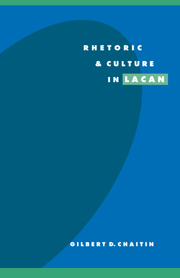Book contents
- Frontmatter
- Contents
- Acknowledgements
- 1 Introduction
- 2 Treeing Lacan, or the Meaning of Metaphor
- 3 A Being of Significance
- 4 From Logic to Ethics: Transference and the Letter
- 5 Desire and Culture: Transference and the Other
- 6 The Subject and the Symbolic Order: Historicity, Mathematics, Poetry
- 7 Conclusion: Lacan and Contemporary Criticism
- Bibliography
- Index
4 - From Logic to Ethics: Transference and the Letter
Published online by Cambridge University Press: 04 September 2009
- Frontmatter
- Contents
- Acknowledgements
- 1 Introduction
- 2 Treeing Lacan, or the Meaning of Metaphor
- 3 A Being of Significance
- 4 From Logic to Ethics: Transference and the Letter
- 5 Desire and Culture: Transference and the Other
- 6 The Subject and the Symbolic Order: Historicity, Mathematics, Poetry
- 7 Conclusion: Lacan and Contemporary Criticism
- Bibliography
- Index
Summary
But whence comes this striking preference for ambiguous speeches in Gradiva?
Freud, Delusion and DreamAll general propositions deny the existence of something or other. If you say ‘All men are mortal’, that denies the existence of an immortal man, and so on.
Russell, ‘The Philosophy of Logical Atomism’ in Logic and Knowledge‘Point de caption’, Lacan protests in the preface to the Points edition of Ecrits, is his translation of the Stoics' lekton – the ‘expressible’ – a verbal function which forms the joint between the Stoics' logic and their ethics. The example from Racine he used when introducing the expression point de caption shows that it was not primarily a matter of theory, truth and falsehood, but of a kind of ethical action, in this case the conversion of fear into courage. Historians of philosophy specify that this ‘expressible’ is always an action, a fact or an event, never a state, a potentiality, or a concept. Bréhier points out that in Stoic logic, ‘A body is warm’ was an incorrect judgement; the proper form was, ‘A body warms up’, since they did not accept the idea of a property, ‘warmth’, that would be attributed to the subject. For them, warming up was rather an occurrence which befell the body in question. The lekta thus introduced into the real of material bodies, or beings apprehensible through the senses, a series of relations that existed only in language and were expressible as verbs or the combinations of verbal expressions we call compound and complex sentences.
- Type
- Chapter
- Information
- Rhetoric and Culture in Lacan , pp. 114 - 149Publisher: Cambridge University PressPrint publication year: 1996

